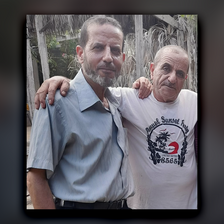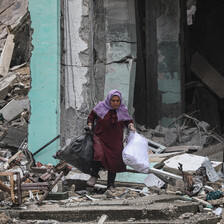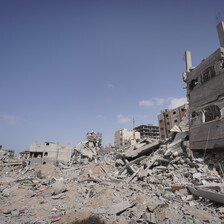The Electronic Intifada 27 October 2023

Israel is bombing Khan Younis in southern Gaza despite indicating that people who moved there would be safe.
Xinhua via ZUMA PressIt feels like the people of Gaza all have a master’s degree in war.
For more than 16 years, we have been living under siege and subjected to a series of major attacks. I have witnessed a huge amount of Israel’s violence myself.
The surprise operation mounted by Palestinian resistance fighters on 7 October was directed at the apartheid state of Israel.
Israel’s apartheid regime controls every single aspect of our lives.
It has forced all of Gaza’s people to live in an open-air prison. We are seldom able to travel away from that prison and we have great trouble getting supplies from abroad.
Israel has been killing civilians in occupied Jerusalem and elsewhere in the West Bank routinely.
And for a long time, Israel has been testing its weapons on Palestinians, whether they are involved directly in resistance or not.
Although we are used to being under Israeli attack, the current war against Gaza is worse than anything we have previously experienced.
Israel has demolished entire streets, making it extremely difficult for people to survive by moving from one place to another.
No warning
On 8 October, Israel bombed a number of buildings in my neighborhood. No warning was given.
My father told us to gather up some food and evacuate to another apartment. This apartment is located in the middle of the building, rather than overlooking the street.
We have gathered there during earlier Israeli attacks on Gaza.
On 9 October, we heard that a building in the Sheikh Radwan area of Gaza City had been attacked by Israel’s warplanes. The building is located next to my grandparents’ home.
My three aunts and two uncles were huddled in the living room with their children and my grandmother when their neighbors were bombed.
“All my brothers are in the house,” my mother screamed when she heard about the attack on Sheikh Radwan.
We tried many times to reach them but we could not. The internet connection was weak. The whole communications network was not working properly.
Eventually my grandfather responded to a call from my dad.
“Who is speaking?” my grandfather asked.
“Abu Yousef,” my dad said, the name he is known by.
My grandfather could not hear him.
“Who?” my grandfather repeated. He was not able to say any more as the line went dead.
We kept trying to call them. After many attempts, we learned from one of my uncles that everyone gathered in my grandparents’ home was still alive but some were injured. The bomb on their neighbors had also caused immense damage to their building.
Three of my cousins – Zein, Yousef and Dana – were wounded severely. Dana was the worst affected.
It took civil protection workers two hours to rescue her from the rubble.
Zein is still in hospital at the moment.
Beauty annihilated
The news for the next few days was horrible. News of people being killed, buildings razed.
We were kept awake at night, unable to get any rest.
Then, we had no electricity. And it was very rare that we could connect to the internet.
For a full three days, we were offline. We could not call relatives or friends to reassure them that we were still living and breathing, though nobody was safe.
My father asked us to buy some candles so that we could have light in the living room.
“The last time we used candles was 19 years ago,” my mother said. I remember that: I was a child when we lit candles.
That night, Israel bombarded Al-Karama, an area in Gaza. Once again there was no warning.
My mom asked Nader, my brother, to call our aunt.
Nader replied that we could not. We had no phone connection or internet.
On 13 October, Israel dropped leaflets in different parts of northern Gaza, including Gaza City. More than 1 million people were instructed to leave their homes and move south.
We packed some clothes and got ready to leave our home.
I saw my father looking at our apartment. He was sad, saying goodbye to things for which he had worked hard.
As a family, we had so many memories of living in this home. How could leaving it be easy?
Off we set for the Khan Younis area, putting our fears to the backs of our minds.
My mother got angry. She wanted to know where everything had gone?
All the beauty in Gaza had been annihilated.
Back soon?
I kept gazing at the masses of people. They had all evacuated their homes.
Like us, they were probably trying to reassure themselves, saying that they would come back very soon.
Salah al-Din Road – Gaza’s main highway – was full of people, heading for the south.
When we arrived in Khan Younis, I was shocked by the numbers of people crowded into schools run by the UN agency for Palestine refugees (UNRWA).
People were hanging their laundry on the balconies of each floor in the school.
Others felt the schools were too miserable, so they were searching for alternative places to shelter.
The streets were full of garbage. I could barely walk on them.
My brother told me not to be surprised at what I saw. Hundreds of thousands had been displaced over the preceding two days.
Khan Younis was bound to be crowded and dirty.
We were unable to find a school where we could take shelter. The classrooms and other parts of every school we saw were too full.
For hours, we kept looking for somewhere to rent. My father told us that we could stay in a small place until we are able to go back home.
The Israelis told us we would be safe in the south. That was untrue.
Israel is attacking Gaza in the north, the south and the middle.
We are not safe anywhere.
The writer is in Gaza.





